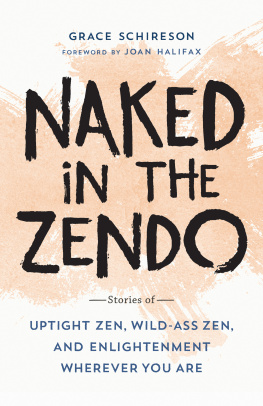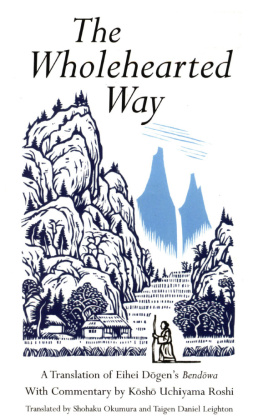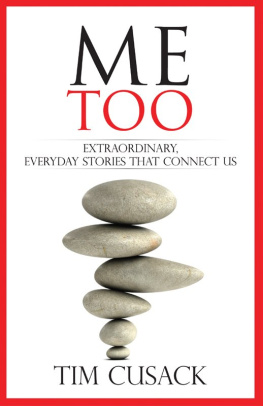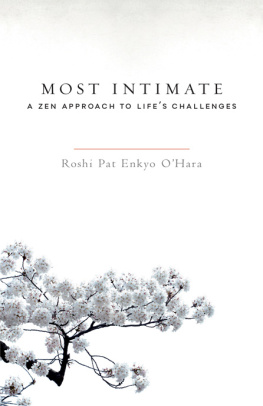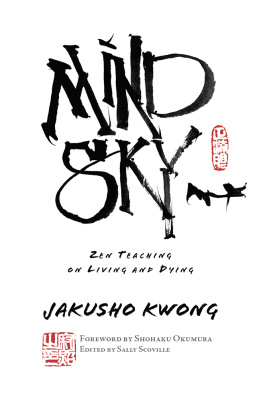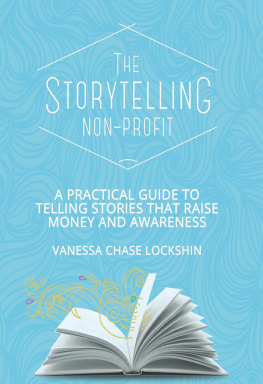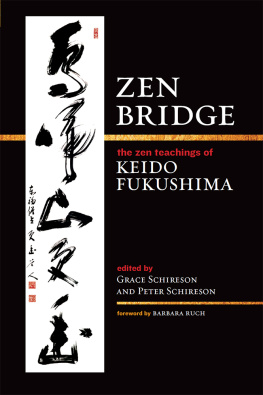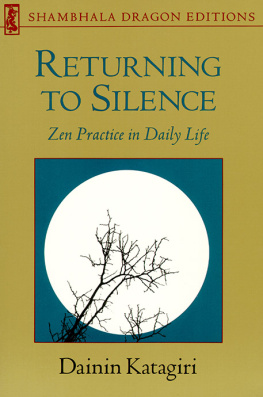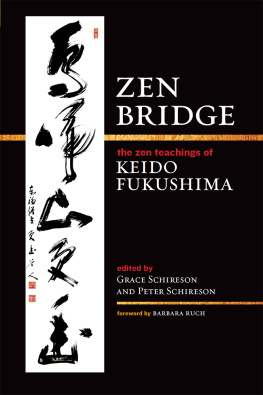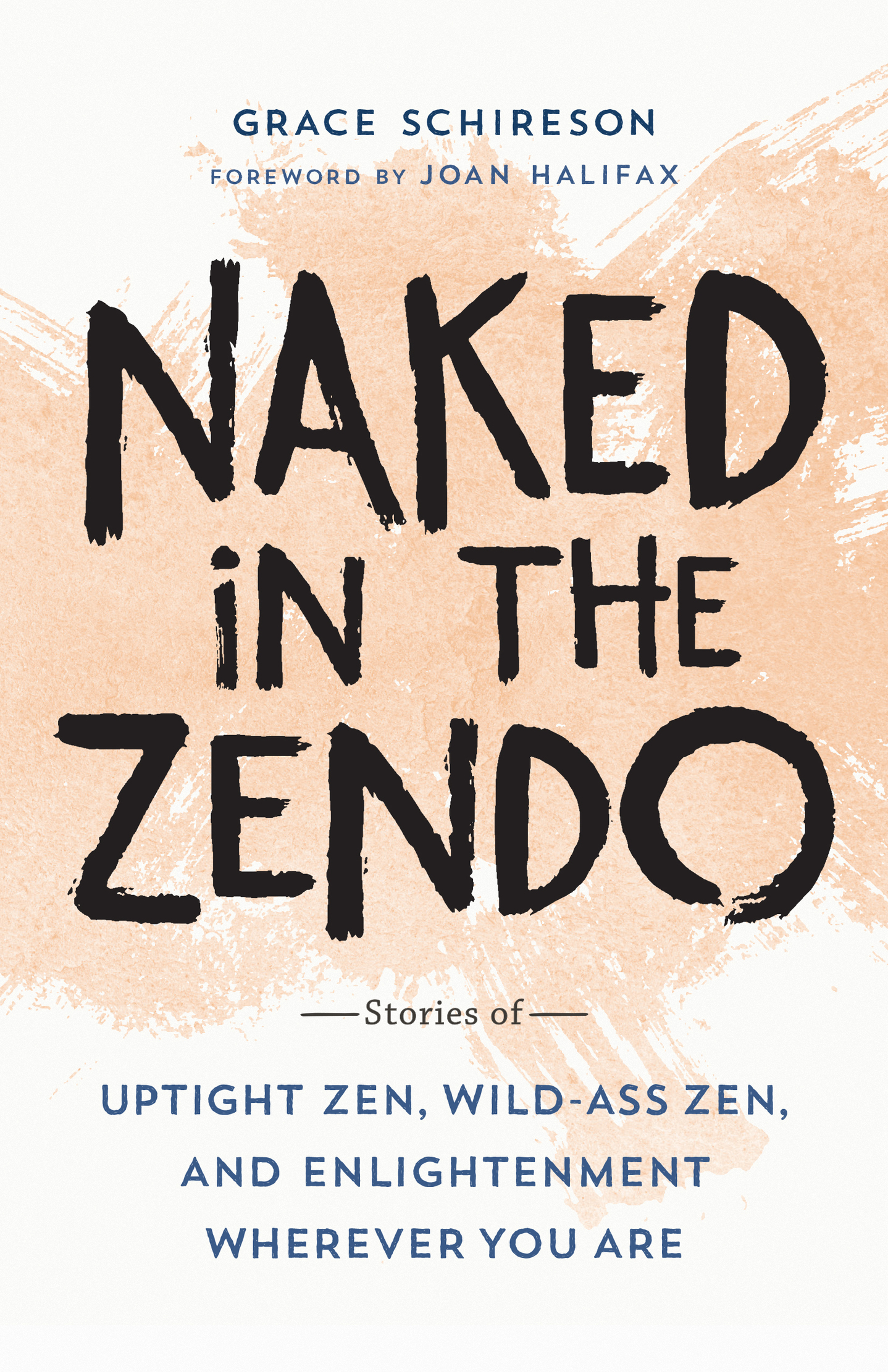Roshi Myan Grace Jill Schireson, PhD, is a teacher in the Suzuki Roshi lineage empowered by Sojun Mel Weitsman, abbot of the Berkeley Zen Center. She has also practiced in the Rinzai tradition, and was encouraged to teach koans by Keido Fukushima Roshi, who was chief abbot of Tofukuji Monastery in Kyoto Japan. Grace is the author of Zen Women: Beyond Tea Ladies, Iron Maidens, and Macho Masters, and the co-editor of Zen Bridge: The Zen Teachings of Keido Fukushima. Grace is the head teacher of the Central Valley Zen Foundation and president of the Shogaku Zen Institute. She has founded several Zen groups in California and currently offers meditation instruction at Stanford University. Grace is also a clinical psychologist specializing in women and families. Married for fifty-one years, she has two sons and four grandchildren.
Sign up to receive news and special offers from Shambhala Publications.
Or visit us online to sign up at shambhala.com/eshambhala.
1
B EGINNING WITH W HAT I S I T ?
As a young child, I remember watching my mind open. Surely as we grow up and mature, we glimpse the possibility to view our own thoughts, emotions, limitations, and strengths. As adults, we try to step back and consider our mind objectively; we are especially motivated to consider our mind when we feel uncomfortable. Watching our thoughts and emotions requires us to see ourselves in a larger context that includes others and our circumstances and conditions. This is our relationship to sky-mind, or awareness. I remember entering this space early in my life, and I believe it helped me through some dark times.
I am the second daughter in a family with two girls and a boy. As a middle child, I received many things secondhand. Some things were worn, and some things, like my mother, were worn out. My sister is two and a half years older than me, which means she would have been about twenty months old when my mother became pregnant with me. My younger brother was conceived when I was five months old. A fourth child would have quickly followed my younger brother if my mother had not found a back-alley abortion. As a teenager, I heard about how she was left weak and bleeding.
My father died when I was six, leaving my mother unprepared to cope financially. She went back to work right away with little infrastructure to care for us children. My brother was sent to live with my grandmotheranother terrible loss for me. I learned to rely primarily on myself and my older sister during my early chaotic years. We know that children find ways to survive hardships and an absence of support. One way is through siblings and invisible friends or forces. Through my sister I found ways to feel connected. But I also found an invisible force toward which I could turnmy own awareness and presence. In my world, I was conversing with God.
My sister, as the eldest, had a special role in the family; her guidance and her castoffsadvice, clothes, toys, but especially bookswere influential and meaningful. She had skills that she passed on to me as well. She taught me to read before I went to school. I remember the lessons she gave me ahead of kindergarten, and I remember one of her books most of all. It was a beautiful leather-bound Bibleit read from right to leftthat my paternal uncle Arnold had brought back from Israel in 1950. I remember what its leather felt like, and I remember the feel of the cover embossed in gold.
Uncle Arnold was a jazz musician who toured the world performing for much of his life. He started with Glenn Miller and other big bands when he was sixteen. He had purchased this Bible in Israel, while performing on a tour, and he gave it to my sister. She, after all, could read, and she, as the eldest, received all special gifts. But she showed no interest in this book and put it away in her drawer with other hidden treasures. I looked into this drawer when she was out of the roomsneaking peeks at her private life. No wonder my family nickname was Sneaky.
The beautiful leather-bound Bible was tucked in with little-girl clothing all around it. I opened the drawer and looked over my shoulder. Sis was nowhere to be seen. I soon lost interest in whatever other treasures I was hunting. I picked up the Bible and turned it over, trying to find the right way to examine it since I could not yet read. I opened it and saw the printed words, which I now suspect were Hebrew. As I held the Bible, I heard a heavenly choir. Even though no one had spoken to me about this book, I felt its power. For a moment I stood transfixed, taking in the amazing message I was receiving. This book mattered; this book was different. This book held secretssecrets that would wait but that would continue to matter to me. Right then I needed to tuck the book back into its hidden home among little-girl clothing. I knew I would return to this message later.
I remember that moment as if it were right now. I feel the power of the heavenly choir. The wonderment I felt, I feel today. The books singing power in my hands has inspired me throughout life. I was bathed in the power. In considering your own life, can you remember what called you and how you stay true to that calling? My life did not follow that book; it followed my experience holding the book, the power of what was yet to be revealed.
So my spiritual life did not begin with meditation practice. It began when I realized that the universe was holding me and singing to me its amazing song. Since I went to a Jewish Sunday school, I called that presence God, and I also knew the conversation with Him was always available to me. I merged my experience holding that evocative leather-bound Bible, the Israeli Old Testament, with what I learned in Sunday school. The Sunday school lessons were about how certain men had conversations with God. I just assumed I could have that same relationship. I could speak and be heard; He would answer me. I knew that I was with God and that He was watching me, waiting to converse.
My family did not continue my religious training; it became too expensive after my fathers death. But in high school I went to synagogue with a Jewish girls social group. I had joined the group for the parties with Jewish boys, but I loved my time at temple in the same way I had as a small child. On the rare occasions when I went to temple, I found that the shared calling out to God, the singing, amplified my sense of being in dialogue. I found being among practicing Jews inspiring. We were all calling out, we were all singing, and we were all being held in Gods presence. This feeling was embodied joy. I did not think these thoughts; I felt them in my body.
When I learned to meditate, I felt the same joy in my body, and I felt that I belonged to a vast space. I recognized a connection to something far beyond my small self. In my first spiritual experience, as a four-year-old middle daughter, I felt held in a vast context. I was in contact with a space that held everythinga space that could answer my questions. My relationship to it allowed me to have deep conversations when I was overwhelmed by events. I had such a conversation the night my father died.
One night my father did not come home from work; he was killed in a car accident by a drunk driver. As a six-year-old, I began by wondering how I had somehow caused his death. Yet the space opened, and within the vast space available to me I was able to consider the facts. I reviewed the events and my own activities in my conversation with God. I considered that my father had gone to work, that he had driven home, that a (drunk) driver had hit his car, and that he had died. As I reviewed my potential involvement in his death within Gods view, I concluded that I hadnt caused this car accident. My fathers work life was beyond me, his commute was beyond me, and the activity of the drunk driver was also beyond my control.

